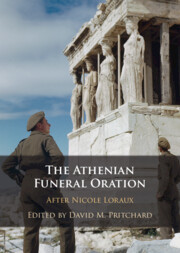Book contents
- The Athenian Funeral Oration
- The Athenian Funeral Oration
- Copyright page
- Contents
- Figures and Tables
- Contributors
- Foreword
- Preface
- Abbreviations
- 1 The Funeral Oration after Loraux
- Part I Contexts
- Part II The Historical Speeches
- Part III The Literary Examples
- 8 Gorgias’ Funeral Oration
- 9 Authorship and Ideology in Lysias’ Funeral Oration
- 10 Corrupting the Youth in Plato’s Menexenus
- 11 ‘To Gloat Over Our Catastrophes’: Isocrates on Commemorating the War Dead
- Part IV Intertextuality
- Part V The Language of Democracy
- References
- General Index
- Index of Sources
11 - ‘To Gloat Over Our Catastrophes’: Isocrates on Commemorating the War Dead
from Part III - The Literary Examples
Published online by Cambridge University Press: 11 January 2024
- The Athenian Funeral Oration
- The Athenian Funeral Oration
- Copyright page
- Contents
- Figures and Tables
- Contributors
- Foreword
- Preface
- Abbreviations
- 1 The Funeral Oration after Loraux
- Part I Contexts
- Part II The Historical Speeches
- Part III The Literary Examples
- 8 Gorgias’ Funeral Oration
- 9 Authorship and Ideology in Lysias’ Funeral Oration
- 10 Corrupting the Youth in Plato’s Menexenus
- 11 ‘To Gloat Over Our Catastrophes’: Isocrates on Commemorating the War Dead
- Part IV Intertextuality
- Part V The Language of Democracy
- References
- General Index
- Index of Sources
Summary
In 1981, when Nicole Loraux published The Invention of Athens, it still seemed possible to take Isocrates’s Panegyricus as evidence for the funeral oration because of his treatise’s explicit appropriation of this genre. At the time, Isocrates was seen as a simple pamphlet-writer, who reflected the popular morality of fourth-century Athens. Forty years later, however, Isocratesʼ ‘pamphlets’ are now seen as rhetorical declamations or even real philosophical works. This chapter reconsiders Isocrates’ relationship to the funeral oration in light of this new reading of his oeuvre. It demonstrates that Isocrates took a critical, if not hostile, stance towards the public funeral for the war dead. While he acknowledged myth’s value as a moral paradigm for contemporary politics, Isocrates repeatedly argued that history since the Persian Wars had all been a moral decline for both Athens and Sparta. Since the public funeral had always commemorated the Athenian war dead of this period, Isocrates described it as a display of Athens’s abject failure. While he did appropriate some aspects of the funeral oration for his own purposes, Isocrates’s breaking of the continuity between Athens’ mythical and historical exploits challenged a central contention of this prestigious genre.
Keywords
- Type
- Chapter
- Information
- The Athenian Funeral OrationAfter Nicole Loraux, pp. 241 - 258Publisher: Cambridge University PressPrint publication year: 2024



